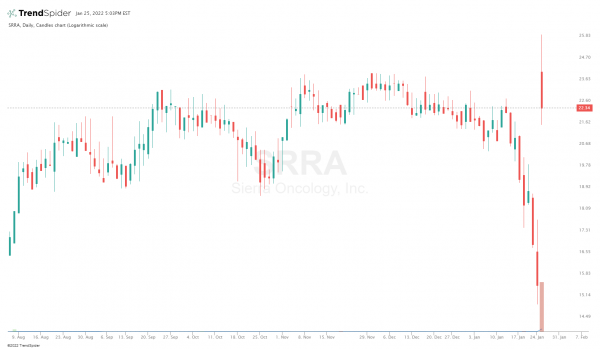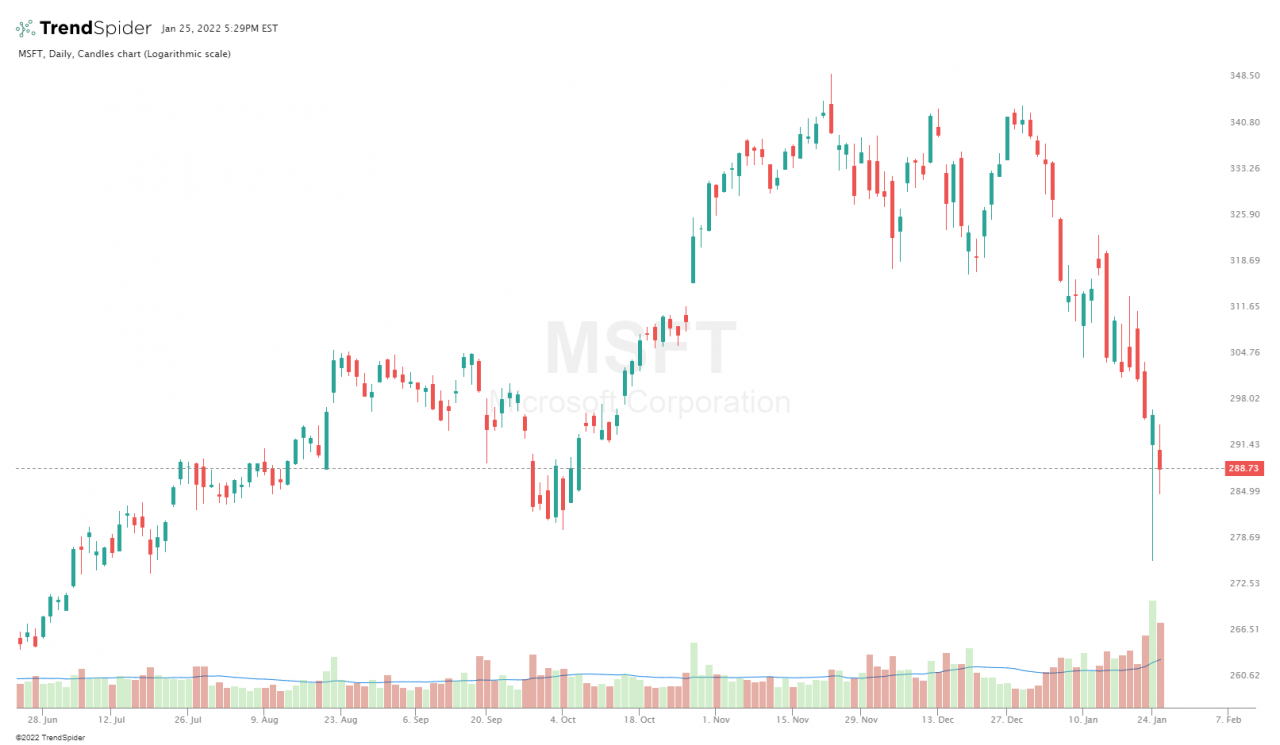Good evening, everyone. Each index was back in the red as we await the Fed’s meeting tomorrow.
The Nasdaq got hit the hardest, dropping 2.28%. Small-cap Russell 2K descended 1.45% and the S&P 500 slid 1.22%. 💔
Sierra Oncology jumped 46.23% today after Momelotinib fulfilled all of its primary and secondary goals in a phase 3 study of therapy for myelofibrosis patients. 👩🔬 Here’s the daily chart:

The energy ETF $XLE exploded 3.88% to close at seven-year highs today. 📈 Financials was the only other sector to register a gain. Tech tumbled 2.31%.
Bitcoin traded flat while Ethereum erased 1%.
Microsoft dipped 5% in extended trading after its Q2 earnings report. See more below. 🤷
$BALY blasted 22.65%, $KOS climbed 11.8%, and $HNT.X hopped 12%.
Here are the closing prices:
| S&P 500 | 4,356 | -1.22% |
| Nasdaq | 13,539 | -2.28% |
| Russell 2000 | 2,004 | -1.45% |
| Dow Jones | 34,297 | -0.19% |
M&A
Nvidia to Abandon ARM Deal
According to Bloomberg, Nvidia is quietly preparing to abandon its $40 billion bid for chipmaker Arm. 👋
The planned acquisition has been held up since it was announced in Sept. 2020. In Dec. 2020, the U.S. Federal Trade Commission (FTC) sued to stop the transaction on the basis that Nvidia would “become too powerful if it gained control over Arm’s chip designs.” Maybe that’s a fair criticism… after all, Nvidia is the 12th largest company in the world by market capitalization.
The acquisition also faced resistance in Arm’s home country, the United Kingdom. Some other countries who also didn’t approve include China, The European Union, chipmaker Qualcomm, and big tech giants such as Google and Microsoft (who resisted the deal privately in correspondence with the U.S. FTC.) 🥊
It’s not over yet, but given the hurdles that lie ahead, we expect to hear more about the lapse of this deal. Analysts have already commented on the high bar of regulatory scrutiny involved in this deal, after all. Perhaps Nvidia has decided that this situation is too much for too little. 🤷 $NVDA stock took a haircut on the news, with shares falling a combined 9% today. Oof.
Nvidia’s loss today is no joke, but somebody will lose even bigger than Nvidia: Japanese multinational bank SoftBank stands to take a monster-sized L if the deal gets bounced. SoftBank, Arm’s largest shareholder, would have stood to make $74 billion from the acquisition. Consequently, it’s a possibility that SoftBank will seek an IPO for the chipmaker. The bank’s U.S-listed shares traded 3.5% lower today.
You can follow the conversation around Arm Holdings on Stocktwits. 😁
Sponsored
Final Month to Invest in the Company Reimagining a $19.6B Industry
Knee & hip joint replacements make up a $19.6B industry, but 10-15% of replacements result in significant complications, and almost ⅓ of patients regret the procedure.
That’s why Monogram Orthopedics is designing an advanced orthopedic solution that aims to combine advanced imaging, 3D printing, and robotics for optimized bone implants and precise surgical procedures.
Monogram has already raised $13M+ from 8,500+ shareholders. For a limited time you can join the joint revolution.
Your last chance to invest in Monogram is February 18.
Inflows to equity-centric ETFs have collapsed in the new year, overshadowed by redemptions amidst market uncertainty. According to ETF.com, the top 10 redeemed ETFs have posted net outflows of more than $28.2 billion since the start of the year. 😬
America’s favorite index fund, the SPDR S&P 500 ETF Trust, has seen more than $10.3 billion of those outflows. During this period, $SPY fell by 9% YTD. It was joined at the hip by another high-flying, low returner YTD, the Invesco QQQ Trust tracking the top 100 stocks in the Nasdaq Composite. $QQQ saw net outflows of $4.1 billion, during which the ETF lost more than 14%.
Other equity index ETFs such as $IVV (tracks the S&P 500), $IWM (tracks Russell 2000), $IWF (tracks Russell 1000 growth) posted more than $1 billion in net outflows each. 👎 Other indexes tracking corporate bonds and treasuries also posted multi-billion dollar net outflows.
Gold, often referred to as a “risk asset,” has only posted net inflows of $1.96 billion over the YTD period. It ranks #4 in “top 10 creations,” according to ETF.com. Gold is behind other equity ETFs such as the Vanguard Total Stock Market ETF, which posted more than $2.66 billion in inflows during its 9.8% fall YTD. Even more interestingly, some perma-bulls risked on by picking up a leveraged version of $QQQ. The ProShares UltraPro QQQ, which is down 37.7% YTD, posted net inflows of $2.47 billion.
The top ETFs with outflows and inflows is not a definitive, nor exact, measure of bullishness or market momentum. However, it does point to where investors have fled in the near and intermediate-term. 🏃 What can be determined from these moves is that generally, investors are moving to cash.
While some investors are staying long, the overwhelming consensus is that things are turbulent — rather than playing with fire, traders are playing with liquid. 🌊
Earnings
Microsoft Earnings
Tech giant Microsoft topped earnings and revenue expectations after-the-bell, but still tumbled 5%…
Earnings per share: $2.48 adjusted, +22% YoY (analysts expected $2.31)
Revenue: $51.7 billion, +20% YoY (analysts expected $50.88 billion)
Azure and other cloud services revenue grew 46% YoY, but fell from the prior quarter’s growth of 50%. ☁️ Net income soared 21% YoY to $18.8 billion.
Last week, Microsoft made headlines when it reported a deal to buy Activision Blizzard for $68.7 billion. Microsoft hopes to become a gaming behemoth with Activision Blizzard’s collection of games, which features “Call of Duty” and “World of Warcraft.” The deal is anticipated to finish in 2023. However, closing such a deal won’t be easy.🚨
$MSFT is down 14.25% YTD. Here’s the daily chart:

Shares of global casino and racetrack company Bally’s surged 23% today after one of the company’s biggest shareholders, Standard General, offered to buy the rest of the company for $38/share, or $2.07 billion. ⚡ 🎲
Standard General, a hedge fund owned by Bally Chairman Soohyung Kim, is not currently Bally’s majority stakeholder, so the $2.07 billion deal will require approval by other stakeholders. However, given the close association, this deal stands fair odds to close after its leadership (including Kim) considers its potential ramifications.
What is Bally’s? Bally’s was the entertainment company in the 20th century known for the Six Flags amusement park chain and popular video games like “Pac Man” or “Space Invaders.” 👾 Hilton Worldwide Holdings Inc. bought Bally’s in 1996, and Hilton’s casino segment was purchased by Harrah’s Entertainment in 2005. Harrah’s renamed the casino biz Caesars Entertainment.
During the pandemic, Twin River Worldwide acquired Bally’s from Caesars and renamed the brand Bally’s Corp. Now that we’ve come full circle, Bally’s could be absorbed by the company’s chairman in a bizarre bid to give a hedge fund some perceived alpha. 😅
Read more in the WSJ.
Bullets
Bullets from the Day
SAT to go digital. The College Board‘s most popular standardized exam, the SAT, will soon give new meaning to the phrase “put down your no. 2 pencil.” The nonprofit will shift to a completely online, digital test in 2024. The changes are likely a direct result of The College Board’s diminished revenue during the COVID-19 pandemic, during which standardized testing was “optional” for admission at many universities. The College Board made $1.2 billion in 2020. Read more in NY Times.
Florida cities sweep the WSJ’s housing index. Thanks to the work-from-home life and Florida’s sunny weather/beaches, several Florida cities took top spots on the Wall Street Journal’s emerging housing markets index. Naples, Cape Coral, Punta Gorda, and Sebastian were among the state’s top-ranking markets. Tampa is currently ranked Zillow’s hottest housing market, and 8/10 of Redfin’s top neighborhoods were in Florida. Read more in WSJ.
Fidelity joins the Reddit wave. The Wall Street Journal reported on Fidelity’s rising profits since investing in the future of cryptocurrencies and retail favorites. Once the firm’s CEO Abigail Johnson took over and re-strategized, Fidelity’s individual investment accounts have gone up by two-thirds since EOY 2014. Now, Fidelity is expanding its resources for individual investors to shift away from firm-managed funds, with capital allocated towards reduced fees and a larger customer service branch. Read more in WSJ.
It’s anticipated that the Fed will start raising rates in March. The Fed’s two-day meeting to discuss inflation-related policy starts on Tuesday and will last until Wednesday this week. It’s expected that the Fed will raise the federal funds rate in two months to tighten pandemic-era monetary policy. Read more in CNBC.
Links
Links That Don’t Suck:
🦴 AI, robotics, 3D printing, oh my! Invest in some much-kneeded innovation right here. *
🏈 42.7 Million People Watched the Kansas City Chiefs’ Thrilling Win Over Buffalo Bills
💡 Biden Will Host CEOs at the White House to Promote His Stalled Build Back Better Bill
🖥️ The Path to Unionization Has Been Rough for Raven Software, and It’s About to Get Rougher
🦈 Shark Attacks Return to Pre-Pandemic Levels
⚡ The Best EVs for All Different Types of Drivers
*this is a sponsored post





